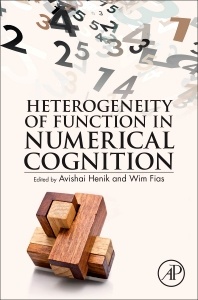Description
Heterogeneity of Function in Numerical Cognition
Coordinators: Henik Avishai, Fias Wim
Language: English
Subject for Heterogeneity of Function in Numerical Cognition:
Keywords
arithmetic abilities; arithmetic fact; Arithmetic; Associative learning; Automatic interferences; children; cognitive control; Cognitive control; Cognitive development building blocks; cognitive flexibility; cognitive training; conceptual understanding; Control; Declarative Knowledge; Development; development; dyscalculia; executive functions; Executive Functions; extensive quantity; factual knowledge; fraction understanding; Functional brain circuits; Heterogeneity; inhibition mathematics achievement; inhibition; intensive magnitude; interference; Interference; intervention studies; longitudinal; Long-Term Memory; Mathematical learning; mathematical reasoning; mathematics achievement; mathematics; Mathematics; memory; mental calculation; mental number line; Mental Number Line; mental rotation; Neurocognitive systems; Neuroimaging; Neuronal Recycling; number line; Numbers Processing; numerical cognition; Operational Momentum; patient; Phonology; procedural knowledge; Procedural Knowledge; Procedural memory; proportional reasoning; Reading; scaling; selective attention; serial order; Skill; SNARC; SNARC-Effect; Spatial Attention; spatial thinking; spatial; Stroop task; Symbolic mapping; Systems neuroscience; temporal; Unitary; updating; working memory; Working memory; Working Memory
480 p. · 15x22.8 cm · Hardback
Description
/li>Contents
/li>Readership
/li>Biography
/li>Comment
/li>
Heterogeneity of Function in Numerical Cognition presents the latest updates on ongoing research and discussions regarding numerical cognition. With great individual differences in the development or function of numerical cognition at neuroanatomical, neuropsychological, behavioral, and interactional levels, these issues are important for the achievement of a comprehensive understanding of numerical cognition, hence its brain basis, development, breakdown in brain-injured individuals, and failures to master mathematical skills. These functions are essential for the proper development of numerical cognition.
Section I. Language 1. Numbers and language: What’s new in the past 25 years? 2. The interplay between learning arithmetic and learning to read: Insights from developmental cognitive neuroscience 3. Language and arithmetic: The potential role of phonological processing 4. Discussion: Specific contributions of language functions to numerical cognition
Section II. Performance Control and Selective Attention 5. An introduction to attention and its implications for numerical cognition 6. The control of selective attention and emerging mathematical cognition 7. Performance control in numerical cognition: Insights from strategic variations in arithmetic during the lifespan 8. The interplay between proficiency and executive control
Section III. Spatial Processing and Mental Imagery 9. How big is many? Development of spatial and numerical magnitude understanding 10. Is visuospatial reasoning related to early mathematical development? A critical review 11. Neurocognitive evidence for spatial contributions to numerical cognition 12. Which space for numbers?
Section IV. Executive Functions 13. Automatic interferences and their development in the context of numerical tasks 14. The role of executive function skills in the development of children’s mathematical competencies 15. Systems neuroscience of mathematical cognition and learning: basic organization and neural sources of heterogeneity in typical and atypical development 16. (How) are executive functions actually related to arithmetic abilities?
Section V. Memory 17. Numerical cognition and memory(ies) 18. Hypersensitivity-to-interference in memory as a possible cause of difficulty in arithmetic facts storing 19. Working memory for serial order and numerical cognition: What kind of association? 20. Don't forget memory ... to understand mathematical cognition
Neuroscientists, cognitive neuroscientists, neurophysiologists, neurologists, cognitive and developmental psychologists, graduate students, and post-doctoral fellows.
Dr. Fias is a Professor of Experimental Psychology at Ghent University. He is currently editor-in-chief of the Journal of Numerical Cognition and has been consulting editor for Journal of Experimental Psychology: Learning Memory and Cognition and was an editorial board member of the journal Cognition. He serves regularly as an ad hoc reviewer for all major journals in the domain of Cognitive Psychology and Cognitive Neuroscience. Dr. Fias has over 100 publications on the topics of numerical cognition, working memory and cognitive control. His research uses behavioral and neuroimaging techniques in a complementary way.
- Provides an innovative reference on the emerging field of numerical cognition and the branches that converge on this diverse cognitive domain
- Includes an overview of the multiple disciplines that comprise numerical cognition
- Focuses on factors that influence numerical cognition, such as language, executive attention, memory and spatial processing
- Features an innovative organization with each section providing a general overview, developmental research, and evidence from neurocognitive studies




